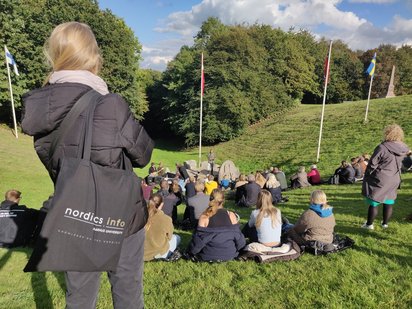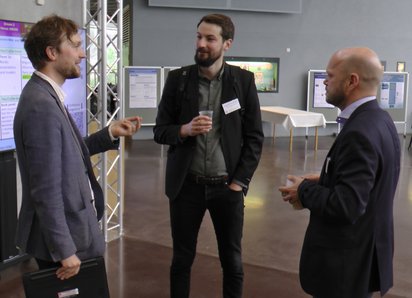What is important to young people in the Nordic region?
The content of the New Nordic Lexicon is based on input by young people and researchers

We asked young people and researchers about what was important for their lives and research now and in the coming years, and what terms and concepts should be included in the New Nordic Lexicon.
We spoke to around 125 university students from the universities of Aarhus, Södertörn, Helsinki (Nordic Studies), Oslo and Iceland. Students were studying at different levels in a variety of subjects including history, post-colonial literature, media studies, teacher education, Nordic Studies and multiculturalism. We also spoke to around 25 Danish and Norwegian high school students at Den Danske Talefest, as well as listening to their speeches. Students and researchers were also given the opportunity to fill in our online survey.
31 researchers took part in the consultation, mainly from within history, literature and language, cultural studies, and Nordic studies, but also law and political science. They were mainly from across the Nordic countries and autonomous regions, with a few scholars from Scandinavian Studies elsewhere.
On this page we share an overview of their suggestions which will all impact on the content of the New Nordic Lexicon. We cannot cover all the topics mentioned in our first 50 articles which will be published in 2023/24, but we will try to cover as much as we can. 15 podcasts will be coming out from September to December 2023, and 10 films in early 2024.
If you have a suggestion for us, or if you are a researcher or student who would like to be involved, then please get in touch at nordics.info@cas.au.dk.
Many thanks to all those who took part!
The nordics.info team
Results of the Consultation
There was a big interest in traditional Nordic subjects, like the universal welfare state, anti-corruption and trust. But there was an equally large interest in new, niche issues, as well as alternative perspectives.
In many cases opposites were mentioned by different or even the same respondents, such as, inequality/equality or social cohesion/divisions. There were requests for bare facts, such as an overview of all the Nordic political parties, and there were also requests for more discursive and subjective subjects, to do with image, rhetoric and projections of the region, such as, how Viking heritage is portrayed in modern society.
Many students reported that they were learning new or different things about the Nordic region now than when they were at school - and that these two versions did not always match one another.
It was difficult for all respondents to summarise what they found interesting and important into one term or a short phrase. In the survey, for example, the words respondents thought should be included in the lexicon did not always match what they find most important or interesting about Nordic history, culture or society.
Below, you will find a summary of the consultation under society, history and culture. Although these are broad topics and often overlap, we have divided subjects between them.
- Under ’Society’, we have included economics, gender and politics.
- Under ’History’, we have included war and peace, geopolitics, colonial relationships, democracy and social movements.
- Under ’Culture’, we have included cultural heritage, traditions, childhood, literature, broadcasting, education, art, digitalisation and language.
Society
Young people are interested in comparisons between Nordic policies
The state of society in the other Nordic countries (policies on alcohol, integration and gender, for example) were of great interest to young people. Some were interested in politics and decision-making (“How can young people be more involved and how can their voices be heard?”) One wanted an overview of the political parties and systems, some wanted a focus on the rise of nationalistic politics and populism (“Is Denmark becoming more polarised like the US?”). One questioned the composition of parliamentary commissions when they sometimes seem to be biased. Some were concerned about issues that concern them on a daily basis or are likely to in the future, like the cost of living, climate issues, care of the elderly, pensions or education.
Researchers interested in classic building blocks of Nordic society
Researchers were predictably interested in their own subject areas and associated methodologies, which led to a wide variety of answers from the anthropocene to leadership styles in business to whiteness. Researchers appeared more inclined to point to the classic Nordic subjects like: the universal welfare state; economic prosperity; progressiveness; anti-corruption; healthcare; trust; inclusive economies; the relationship between the Nordics and other parts of the world; and, Nordic regional cooperation. Others pointed to the contemporary challenges associated with these classic pillars of Nordicness, such as, food supply; modes of consumption; preparedness and crisis management; the future of work; current and future fiscal management of the welfare state, and housing.
Crisis, integration and gender among main themes
Crisis was one of several main themes running through the consultation, including COVID-19 and the climate. Some young people were passionate about the climate crisis, with specific topics like ground water pollution or nuclear power being mentioned, while with others it was not on their radar at all. Mental health came up in various contexts, but there was also a questioning of the media hype of a ‘mental health crisis’ among young people. Overall, many young people expressed their frustration and anger at previous generations or a feeling of helplessness, that is, they feel like they are being left with many insurmountable issues to deal with.
Multiculturalism and integration were prominent in the consultation responses, with young people mentioning issues to do with mixed heritage, cultural barriers, xenophobia, ex-pats, refugee movements, and more specific debates, like those about the use of the hijab in schools. The terms integration and anti-integration both came up, and some people also questioned whether the welfare state itself might in fact be discriminatory by excluding some people.
Gender issues and gender norms were also fairly prominent (see more on this below under ’History’). Here also the generation gap was highlighted, the difficulty of understanding each other across the generations – also in relation to how things may get lost with the passing of generations.
Please see below for a list of specific words which were suggested to do with ’Society’.
Nordic terms to do with 'Society'
Specific terms suggested to do with ’Society’:
- Childhood;
- Digital literacy;
- Dugnad (A type of voluntary work, in Norwegian);
- Folkhemmet (The People’s Home, in the Scandinavian languages);
- Gender;
- Sila (Weather, soul, land/ice/sea, in Greenlandic);
- Gulahallat (To communicate/understand one another, in Sámi);
- Humour;
- Hyggehomfobi (Everyday homophobia, in Danish);
- (U)Hygge (Cosiness or absence of it, in Danish);
- Kulturkristen (’Culture Christian’, in Danish);
- Lagom (Just the right amount, in Swedish);
- Lykke (Happiness in Danish);
- Tryghed (Security/safety, in the Scandinavian languages);
- Petrocultures;
- Racism;
- Universal welfare state;
- (Social) Welfare.
History

Looking back at history after the invasion of Ukraine
Some young people were interested in looking back at the Cold War and World War I and II, and the circumstances surrounding these in light of the invasion of Ukraine. Similarly, there was an interest in energy history and supply: “How have our energy sources been built up over the years?”; “How has energy insecurity come about?” Researchers’ responses echoed these concerns, referring to, for example defence, also in relation to the European Union, NATO, migration, energy policy, and Putinism.
The Nordics region's position in the world
Both young people and researchers requested overviews of the relationship between the Nordic region and other geopolitical blocks, such as, Russia, the Baltic states, the Arctic and the European Union. Similarly, some researchers thought it important to situate the Nordics between ‘east’ and west’ as well as in relation to European identity, both historically and in a contemporary setting (“Beyond Eurocentrism” was also mentioned). The Nordic countries abroad with respect to, for example, humanitarianism, development history and multinationals, were also considered important.
Several people mentioned the Vikings, both in relation to contemporary broadcasting and associated tourism, such as with respect to The Game of Thrones, and as historical figures.
Historical development of equality and inequality
Broad questions of equality and inequality were of great interest. These stemmed from classic building blocks of the Nordic countries, such as the social welfare net, relatively high taxes, the labour movement, democracy – and, for some, Lutheranism and the religious roots of modern society. Young people persistently questioned whether the Nordic countries really are that equal, and, even if they are comparatively so, they want to know about hidden inequalities; how specific types of discrimination have developed historically and been dealt with from an institutional point of view, as well as how social movements and civil society have responded. Specific discriminations mentioned included that of the Sámi, islamophobia, LGBTQI+, equal pay and gender generally. The social movements #MeToo, Black Lives Matter and the anti-gender movement were also mentioned. Current and past colonial relationships and injustices featured – as well as more contemporary ones, like green colonialism.
Interest in underrepresented topics
The impetus to see the Nordics as all the same from outside the region can hide some of its diversity. This was frequently referred to by respondents and led them to suggest that underrepresented areas be included in the New Nordic Lexicon. For example, young people wanted to know more about the differences in the realisation of Sámi rights in Norway, Sweden and Finland. Others were interested in comparing historical types of discrimination with contemporary anti-integration policies, in Iceland for instance. Similarly. some researchers pointed out that, when we discuss the Nordics as a whole, smaller communities, variation and alternative viewpoints go unseen – there is not just one ‘Nordic Model’ after all. Some requested material about this very topic: (“What actually is 'Norden'?”; “What does it consist of and how has it changed over time?”) Indigenous and traditional knowledge and methodologies were seen as important by some researcher-respondents, as were concepts of whiteness and the colonial lens.
Please see below for a list of specific words which were suggested to do with ’History’.
Nordic terms to do with 'History'
Specific terms suggested to do with ’History’:
- Arctic coloniality;
- Baltic;
- Cooperation (in relation to working together generally, Samarbete/samverkan);
- Cooperation (between the Nordic countries);
- Folkestyr;
- Lutherdom,
- Norden,
- Peace;
- Royalty;
- Scandinavianism;
- Viking(s).
Culture
Cultural heritage and language
Cultural heritage came up a lot, both its disappearance and conservation (with respect to smaller communities, for example). Cultural heritage was also questioned in specific contexts, like its use in far-right narratives. Languages in the Nordic-Arctic area were specifically mentioned, as were Faroese oral traditions and the use of English in the Nordic countries.
Issues to do with language were of interest generally, including minority languages and disappearing dialects - language and how it is linked to identity. One young person wanted to know how minority languages are defined and protected. Respondents wanted to know more about official bilingualism in certain Nordic countries or areas, and which languages are taught in schools and why also sparked a lot of interest, such as, Danish being on the syllabus in Iceland, which some saw from a colonial perspective.
Education, childhood, digitalisation and media
Digital lives came up in different contexts, with subjects such as social media and the social consequences of being constantly online, and how the digitalisation of society affects democracy.
Education at varying levels was mentioned, from policies on schools and teacher training, to folk high school and tertiary education. Some young people queried why academic and practical types of courses for young people (ungdomsuddannelse, in Danish) have such differing status in society.
The media was mainly mentioned by researchers, including crime fiction, climate fiction, dogmefilm and Nordic noir, but some young people questioned specific aspects, such as, racial stereotyping in Nordic TV programmes. Young people were interested in stereotypes in general - in conjunction with humour (“A Swede, a Dane and a Finn walked into a bar…”), as well as generally. They also wanted to know about cultural differences across the Nordics, of the different people in the region and that come to the region.
Lifestyle issues such as trust and social cohesion came up mainly amongst researchers, and several were interested in the political and working culture of the Nordic countries e.g., generally flat structures with a high level of informality and trust.
Please see below for a list of specific words which were suggested to do with ’Culture’.
Nordic terms to do with 'Culture'
Specific terms suggested to do with ’Culture’:
- Empathy;
- Faroese literature and society,
- Flightshame/Oilshame;
- Folkelighed (‘Peopleness’ in the Scandinavian languages);
- Fredagsmys;
- Friluftsliv (‘Life in the fresh air’ in the Scandinavian languages);
- Intangible cultural heritage;
- Janteloven/jantelag (’law’ of attitude towards achievements in the Scandinavian languages);
- Kulturarv,
- Kvæði (Heroic ballads in Faroese);
- Maaemo (Mother Earth in Finnish);
- Nature;
- Nordic noir;
- Nærvær/fravær (Intimacy/presence and absence in Danish);
- Solidarity;
- Stereotypes;
- Trust;
- Tjóðskapur (National belonging in Faroese).

